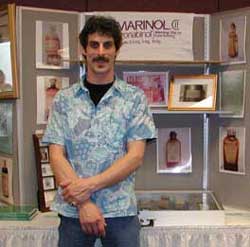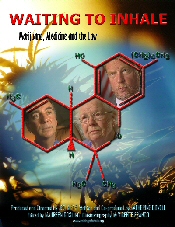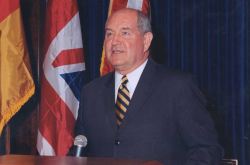Pain contracts that force chronic pain patients to agree to intrusive drug testing and other invasions of privacy are becoming increasingly ubiquitous.
In a first, more than two dozen members of the clergy in Nevada came out in support of regulating marijuana. The news continues to reverberate.
A new government report finds prior drug use by prisoners almost unchanged from a decade ago, but highlights slight increases in prior methamphetamine use while removing alcohol from consideration.
This important new documentary about the medical marijuana movement is DRCNet's latest membership premium.
A tawdry tale out of Tulsa tops the corrupt cops stories this week.
Dr. William Hurwitz will remain in prison pending a new trial after a federal judge decided he was a flight risk.
Florida's Pinellas County has passed a tough new paraphernalia ordinance that lowers the standard of proof necessary to win a sales conviction.
Locked in a tight race, Georgia Gov. Sonny Perdue is making methamphetamine a campaign issue.
The mayor of the Mexican border city of Tijuana has ordered an investigation of all 2,300 city police for links to the drug trade, but there is more to the mayor's move than meets the eye.
New Zealand's drug testing in sports regime is catching hardly anyone using banned substances, and most of those it does catch were just smoking marijuana.
Events and quotes of note from this week's drug policy events of years past.
Visit our new web site each day to see a running countdown to the events coming up the soonest, and more.
Pain contracts. Pain management contracts. Medication contracts. Opioid contracts. Pain agreements. They go by different names, but they all mean the same thing: A signed agreement between doctor and patient that lays out the conditions under which the patient will be prescribed opioid pain medications for the relief of chronic pain. (To see a standard pain contract, click here.)

Oxycontin pills
For some of the tens of millions of Americans suffering from chronic pain, opioid pain medications, such as Oxycontin or methadone, provide the only relief from a life of agony and disability. But with the Office of National Drug Control Policy's ongoing campaign against prescription drug abuse and the Drug Enforcement Administration's (DEA) ongoing crackdown on physicians it believes are prescribing opiates outside the bounds of accepted medical practice, the medical establishment is increasingly wary of pain patients and adequate treatment of pain is a very real issue for countless Americans.
In recent years, doctors and hospitals have turned increasingly to pain contracts as a means of negotiating the clashing imperatives of pain treatment and law enforcement. Such contracts typically include provisions requiring patients to promise to take the drugs only as directed, not seek early refills or replacements for lost or stolen drugs, not to use illegal drugs, and to agree to drug testing. And as the contract linked to above puts it, "I understand that this provider may stop prescribing the medications listed if... my behavior is inconsistent with the responsibilities outlined above, which may also result in being prevented from receiving further care from this clinic."
"Pain agreements are part of what we call informed consent," said Northern Virginia pain management and addiction treatment specialist Dr. Howard Heit. "They establish before I write the first prescription what I will do for you and what your responsibilities are as a patient. They are an agreement in order to start a successful relationship that defines the mutual responsibilities of both parties. More and more states are suggesting we use agreements as part of the treatment plan with scheduled medications. Such agreements are not punitive; they protect both sides in functional way."
If Heit sees a cooperative arrangement, others disagree. "This is really an indication of how the current DEA enforcement regime has created an adversarial relationship between patients and physicians where the doctors feel the need to resort to contracts instead of working cooperatively with patients," said Kathryn Serkes, spokesperson for the Association of American Physicians and Surgeons (AAPS), which has been a fierce critic of criminalizing doctors over their prescribing practices. "The pain contracts are a tool to protect physicians from prosecution. He can say 'I treated in good faith, here's the contract the patient signed, and he violated it.' It's too bad we live in such a dangerous environment for physicians that they feel compelled to resort to that," she told the Chronicle.
"Patients aren't asked to sign contracts to get treatment for other medical conditions," Serkes noted. "We don't do cancer contracts. It is a really unfortunate situation, but it is understandable. While I am sympathetic to the patients, I can see both sides on this," she said.
"There is no evidence these pain contracts do any good for any patients," said Dr. Frank Fisher, a California physician once charged with murder for prescribing opioid pain medications. He was completely exonerated after years of legal skirmishing over the progressively less and less serious charges to which prosecutors had been forced to downgrade their case. "The reason doctors are using them is to protect themselves from regulatory authorities, and now it's become a convention to do it. They will say it is a sort of informed consent document, but that's essentially a lie. They are an artifact of an overzealous regulatory system," he told the Chronicle.
"When this first started, it was doctors using them with problem patients, but now more and more doctors and hospitals are doing it routinely," Fisher added. "But the idea that patients should have to sign a contract like that or submit to forced drug testing is an abrogation of medical ethics. Nothing in the relationship allows for coercion, and that is really what this is."
The pain contracts may not even protect doctors, Fisher noted. "When they prosecute doctors, they can use the pain contract to show that he didn't comply with this or that provision, like throwing out patients who were out of compliance. The whole thing is a mess."

Michael Krawitz (photo courtesy Drug Policy Forum of Virginia)
It is a real, painful mess for a pair of veterans trying to deal with chronic pain through the Veterans Administration -- and it is the drug testing provisions and the use of marijuana that are causing problems. Michael Krawitz is an Air Force veteran who was injured in an accident in Guam two decades ago that cost him his spleen, pancreas, and part of his intestine. Krawitz also suffered a fracture over his left eye, received an artificial right hip, and has suffered through 13 surgeries since then. He had been receiving opioid pain medication at a VA Hospital in Virginia, but things started to go bad a year ago.
"Last year, I refused to sign the pain contract they had just introduced there, and they cut me off my meds because I refused," Krawitz told the Chronicle. "Then I amended the contract to scratch off the part about submitting to a drug test, and that worked fine for a year, but the last time I went in, they said I had to do a drug test, and I again refused. I provided a battery of tests from an outside doctor, but not an illegal drug screen. That's when my VA doctor sent an angry letter saying I was not going to get my pain medicine."
Krawitz has provided documentation of his correspondence with the VA, as well as his so far unheeded complaint to the state medical board. As for the VA, some half-dozen VA employees ranging from Krawitz' patient advocate to his doctor to the public affairs people to pain management consultants failed to respond to Chronicle requests for interviews.
For Krawitz, who has used marijuana medicinally to treat an eye condition -- he even has a prescription from Holland -- but who says he is not currently using it, it's a fight about principles. "I will not submit my urine for a non-medical test," he said. "The VA doesn't have the authority to demand my urine. It's an arbitrary policy, applied arbitrarily. The bottom line is that we vets feel very mistreated by all this. Some of us have sacrificed limbs for freedom and democracy, and now the VA wants to make us pee in a bottle to get our pain medication?"
The imposition of pain contracts is not system-wide in the VA. A 2003 Veterans Health Administration directive on the treatment of pain notes that "adherence with opioid agreement, if used" should be part of the patient's overall evaluation.
Krawitz is preparing to file a federal lawsuit seeking to force the VA to treat him for pain without forcing him to undergo drug testing. For Tennessee vet Russell Belcher, the struggle is taking a slightly different course. Belcher, whose 1977 back injury and spinal fusion had him in pain so severe he couldn't work after 2000, was cut off from pain meds by the VA after he tested positive for marijuana. Belcher said he used marijuana to treat sleeplessness and pain after the VA refused to up his methadone dose.
"It's a wonder to me that some vet ain't gone postal on them," he told the Chronicle. "They pushed me pretty close. To me, not signing the substance abuse agreement is not an option. If you sign it you're screwed, if you don't sign it, you're screwed. I complained for months about the dose being too low, but they said that's all you get and if you test positive for anything we're kicking you out. When the civilian doctors would find marijuana on a drug screen, they told me they would prefer I didn't do that because it was still illegal, but they didn't kick me out of the program. I was using it for medicinal purposes. I have tremendous trouble sleeping, muscle cramps that feel like they'll pull the joint out of the socket. I had quit using for a long time because of this mess with the drug testing, but then they wouldn't increase my pain medicine. I thought I have to do something; it's a matter of self preservation," he said.
"The pain clinic at the VA has discharged me from their care and said the doctor would no longer prescribe narcotics for me unless I attend the substance abuse program," Belcher continued. "They aren't going to be satisfied until I spend 30 days in the detox unit." While Belcher would like to join Krawitz in taking on the VA, in the meantime he is looking for a private physician.
When asked about the veterans' plight, Dr. Fisher was sympathetic. "They made Krawitz sign a contract under duress with forced drug testing as a condition of his continued treatment," he pointed out. "That violates basic rights like the right of privacy. There is no suspicion he is a drug addict. They want to treat all patients as if they were criminal suspects, and that has little to do with what the nature of the doctor-patient relationship should be."
Dr. Heit, while less sympathetic than Dr. Fisher, was decidedly more so than the VA. When asked about the cases of the vets, he explained that he would be flexible, but would also insist they comply with the terms of their agreements. "In the end, you have to choose whether you want me to do pain management with legal controlled substances or you want to use illicit substances, but you don't get to choose both," he said. "I don't disagree that marijuana may help, but the rules are it's an illicit substance. I can't continue to prescribe to someone who is taking an illicit substance."
And here we are. Patients seeking relief from pain meet the imperatives of the drug war -- and we all lose.
back to top
It was the press conference heard 'round the world -- or at least around the country and in every corner of Nevada. Last Tuesday, four Nevada clergymen stood side by side with organizers of the Nevada initiative to regulate and control marijuana to publicly endorse the measure. They spoke for at least 33 Nevada clergy who endorsed Question 7, as the initiative is known on the ballot.
The measure would allow adult Nevadans to legally possess small amounts of marijuana and to purchase it at state-regulated stores. Under current Nevada law, possession of less than an ounce is a misdemeanor offense and all sales are illegal.
Preachers for pot legalization -- for the media, that was as good as man bites dog, and the press coverage showed it. According to a list compiled by the Interfaith Drug Policy Initiative (IDPI), who spearheaded the effort of bringing the clergy on-board, media hits included CNN, MSNBC, every major newspaper in Nevada, repeated features on Nevada TV stations, and an Associated Press story that was picked up by at least 37 media outlets nationwide.
Across Nevada and the country, readers and viewers heard people like the Rev. Ruth Hanusa, chaplain at the Campus Christian Association at the University of Nevada-Reno, explain why they supported changing the marijuana laws. "Some of us Protestants believe that one of the functions of government is to curb sinful behavior," she said. "But our marijuana laws are not curbing marijuana use and they are causing more harm than good by filling the pockets of dangerous criminals and ensuring that children have the easiest access of anyone," she said.
They also got to hear the Rev. Paul Hansen, senior pastor at Holy Spirit Lutheran Church in Las Vegas explain why he supported Question 7. "On its face, our current marijuana laws appear to be moral, but it is a cosmetic morality," said Hansen. "Our current laws are causing virtually unfettered access to marijuana. Marijuana is far easier to access than alcohol because drug dealers don't card," he said.
"This became a big story because most people think that the religious community is the last place on earth to find support for ending marijuana prohibition," said IDPI's Troy Dayton, who has spent much of the year in Nevada. "It is making such a difference because by its very nature it reframes the debate. This marijuana issue is up against a lot of cultural baggage, decades of a government misinformation campaign, and a strong puritan ethic which embraces a spirit of punishment. In addition, many voters think they are voting on whether or not they think marijuana is good or not; not what the best policy regarding marijuana best serves the community."
Gaining the support of such respected community leaders is critical for gaining support for the cause, Dayton told Drug War Chronicle. "It doesn't matter if our side has better reasoning if the average voter dismisses the issue without a careful and open-minded inquiry," he said. "When the average voter hears about religious leader support, first his attention is grabbed, and secondly the cognitive dissonance of this reality forces a reframing of the issue in his mind. No one could accuse these religious leaders of being in favor of marijuana use and they are clearly respected moral leaders in the community. So this makes people wonder, 'Why are they supporting this?'"

The faith-based support is providing a boost for a campaign that is in a tight uphill battle to put Nevada over the top as the first state to vote to regulate and control marijuana, said initiative supporters. "To have so many people in the faith-based community who represent so many denominations is a big plus for the campaign," said Patrick Killen, communications director for the
Committee to Regulate and Control Marijuana (CRCM), the group behind the campaign. "Having these people of faith come forward on this shows that creating a sensible alternatives to our state's marijuana laws is an issue that resonates with a diverse array of people in Nevada," he told the Chronicle.
"As far as we know, this is the first time that so many clergy from different denominations have explicitly called for legally regulated sources of access for marijuana," said IDPI executive director Charles Thomas. "And it came about because of a lot of hard work. We had Troy in Nevada for about five months, and our Tyler Smith joined him for a few weeks. They traveled the state and sat down and talked one-on-one with religious leaders, and a number of those people not only took the information and read it, but also took a few days to pray about it. Praying is a way to really reflect on what your deepest values are."
One of those doing some serious reflecting was Pastor Hansen. "Some people from the campaign contacted me this spring, and I was skeptical at first," said Hansen. "I thought it was about a bunch of people who smoked marijuana and wanted a license to do it, but as I began to research the issue, I saw there is a movement in the Western world to rethink our policies toward marijuana, and I thought this was a just position," he told the Chronicle. "When I look at the issue and what they're doing in Holland and all the unforeseen negative consequences of alcohol prohibition, I see a lot of the same things happening in terms of organized crime profiting from an underground criminal marijuana market."
Pastor Hansen made clear he was speaking for himself -- not representing his church or congregation -- as he addressed the issue. While his public stance in favor of Question 7 has won him support, "I've also gotten a few people who expressed their displeasure," he noted wryly. "Lutherans are not all of one mind on lots of issues."
Nor are members of other denominations. But having religious leaders speaking out for marijuana legalization is an advance for the cause. And with Question 7 trailing in some polls and leading narrowly in others, the divine intervention would be most welcome.
back to top
A new report from the Justice Department's Bureau of Justice Statistics (BJS) shows that prior drug use among state prisoners is essentially unchanged in the last decade, while prior drug use among federal prisoners is up slightly. But in presenting the report, Drug Use and Dependence, State and Federal Prisoners 2004, BJS emphasized small increases in prior methamphetamine among state and federal prisoners.

bag of crystal meth, also known as 'ice'
That is at least in part because that's what BJS' clients were interested in, said report author Chris Mumola. "We have a lot of increased demand for information on methamphetamines," he told Drug War Chronicle. "The Office of National Drug Control Policy and correctional administrators want to know about that population."
What BJS found regarding meth was that 7% of state prisoners reported using it in the month previous to arrest in 1997. That figure increased to 11% in 2004. Reported meth use among state prisoners at the time of the offense increased from 4% to 6% during the same period. Federal prisons reported similar increases. Among white prisoners, a full 20% reported using in the month before arrest, compared to 1% of black inmates. Among Hispanics, 12% of state prisoners and 5% of federal prisoners reported meth use in the month prior to arrest. Among women, 17% of state inmates and 15% of federal inmates reported using, compared to 10% of men in both the states and the federal system.
More broadly, the report found that a majority -- 56% -- of state inmates used drugs in the month prior to arrest, with 40% reporting marijuana use, followed by crack or powder cocaine (21%), stimulants (12%), and heroin and other opiates (8%). These state figures are essentially unchanged from 1997, the last time the survey was done.
Interestingly, violent offenders were less likely to have used methamphetamine than either drug or property offenders. Only 4% of violent and property offenders reported using in the month prior to arrest, compared to 14% of drug offenders.
That makes intuitive sense -- and it also raises questions about just what these figures are telling us. Do the rising figures for meth use suggest rising meth use rates, increasing law enforcement attention, or both? BJS wasn't much help. One employee -- not Mumola -- would say only, "We don't do sociology. There is no way of determining that."
"I don't think we know whether this is the result of rising use or rising enforcement," said Marc Mauer, executive director of The Sentencing Project, a criminal justice think tank that emphasizes alternatives to incarceration. "We do know there has been a lot of targeting of resources at meth enforcement in recent years, but that could indicate a greater focus on meth at the expense of other drug law enforcement. This may not indicate any rise in use or sales, but in arrests. We also don't have a good grasp on the extent of meth use, which varies from region to region. It could be important in San Diego, but not in Philadelphia," he told the Chronicle.
Mauer was struck by the report's emphasis on meth. "It's sort of odd that they highlighted this so prominently," he said. "If you look at the overall distribution of drugs that people in prison have used, meth is on the low end. While there are some people in prison who used meth, it is still a modest number. Highlighting those figures plays into the whole public discussion about whether there is a meth epidemic, but when you look more broadly at the whole range of drugs used by prisoners, you get a very different picture."
You could also get a very different picture of prior drug use by prisoners if alcohol were included in the survey, as it was in 1997. BJS does it clients a disservice by failing to include alcohol use, said Mauer. "You can't talk about criminality without talking about alcohol," he exclaimed. "In terms of violent crime, there is much more of a correlation with alcohol than with other drugs. If you want to look at comprehensive substance abuse policy, you are omitting half the problem if you don't look at alcohol."
The reasons for omitting alcohol were not sinister, said BJS's Mumola. "The 1997 report was 16 pages, and this time we had to cut it to 12," he explained. "We had to edit it down and make it more focused. At the same time, there was both increased demand for figures on meth and new measures of dependence and abuse. There is high demand for making better assessments of who needs treatment, so there was a lot of additional content we had to squeeze in, and it would have been impossible to give full treatment to alcohol issues, so we streamlined it."
One thing the report did not mention, but that could be teased out by examining this and other BJS reports on prison population is that there are more than 44,000 people serving prison sentences for marijuana offenses. In a Thursday press release, the National Organization for the Reform of Marijuana Laws (NORML) crunched the numbers. "According to these figures, nearly 45,000 state and federal prisoners are behind bars for having committed some type of cannabis-related offense," said NORML executive director Allen St. Pierre. "This means that US taxpayers are currently spending over $1 billion annually to incarcerate Americans for pot."
But let's not think about that. Instead, let's concentrate on the demon drug du jour. That's what BJS and it's client-driven research did.
back to top
Dear Drug War Chronicle reader:
Many drug reform enthusiasts read on our blog last month about a new video documentary, Waiting to Inhale: Marijuana, Medicine and the Law, and an exciting debate here in Washington between two of my colleagues and a representative of the US drug czar's office that followed the movie's screening. I am pleased to announce that DRCNet is making this film available to you as our latest membership premium -- donate $30 or more to DRCNet and you can receive a copy of Waiting to Inhale as our thanks for your support.

I've known about Waiting to Inhale for a few years, and I am pretty psyched to see it out now and making waves. People featured in the movie -- medical marijuana providers Mike & Valerie Corral and Jeff Jones, patient spokesperson Yvonne Westbrook, scientist Don Abrams -- are heroes whose stories deserved to be told and whose interviews in this movie should be shown far and wide. You can help by ordering a copy and hosting a private screening in your home! Or you and your activist friends can simply watch it at home for inspiration. (
Click here for more information including an online trailer.)
Your donation will help DRCNet as we pull together what we think will be an incredible two-year plan to substantially advance drug policy reform and the cause of ending prohibition globally and in the US. Please make a generous donation today to help the cause! I know you will feel the money was well spent after you see what DRCNet has in store. Our online donation form lets you donate by credit card, by PayPal, or to print out a form to send with your check or money order by mail. Please note that contributions to the Drug Reform Coordination Network, our lobbying entity, are not tax-deductible. Tax-deductible donations can be made to DRCNet Foundation, our educational wing. (Choosing a gift like Waiting to Inhale will reduce the portion of your donation that you can deduct by the retail cost of the item.) Both groups receive member mail at: DRCNet, P.O. Box 18402, Washington, DC 20036.
Thank you for your support. If you haven't already checked out our new web site, I hope you'll take a moment to do so -- it really is looking pretty good, if I may say so myself. :) Take care, and hope to hear from you.
Sincerely,

David Borden
Executive Director
back to top
A tawdry tale out of Tulsa, a New York cop gets off easy, and the Boston Police aren't sure where all the dope went. Just another week of drug prohibition-related police corruption. Let's get to it:

hot times in Tulsa
In Tulsa, Oklahoma, a federal civil rights lawsuit filed by the husband of an exotic dancer is shining a light on some sordid business involving a pair of Tulsa Police Department officers. The lawsuit was filed by Shannon Coyle, the husband of dancer Crystal Garr. Coyle was arrested on drug charges last year by Officer Travis Ludwig, after Coyle filed an internal affairs complaint against Ludwig because Ludwig was sleeping with Garr. Coyle was arrested first on marijuana possession charges, then again on methamphetamine and paraphernalia charges in raids led by Ludwig. When Coyle found out Ludwig was sleeping with his wife, he text-messaged him, warning him to stay away. Ludwig then took those messages to a deputy prosecutor who okayed another arrest for Coyle, this time for intimidating a witness -- Ludwig. All the charges were dropped once officials became aware of the affair, and Ludwig has been disciplined by the department, but he still faces Coyle's lawsuit. So does Officer Israel Rodriguez, whom Coyle also accuses of sleeping with his wife. Ludwig and Garr currently live together, although she remains married to Coyle, the father of her four children. Oh, by the way, the deputy prosecutor who okayed Coyle's third arrest? She had also been sleeping with the busy Ludwig. Read all about this Oklahoma law enforcement Peyton Place in the
Tulsa World, which has in-depth coverage and a handy chart with all the players.
In New York City, a former NYPD narcotics detective got off easy last week when he was sentenced for robbing more than $740,000 from drug dealers over an eight-year period, Newsday reported. Former detective Julio Vasquez, 46, was among five NYPD cops arrested in the scheme, which unraveled when federal agents staking out a drug suspect saw him robbed by Vasquez and fellow cop Thomas Rachko. All of the other cops have pleaded guilty, too. Vasquez got a sweet six-year sentence from federal Judge Carol Amon on October 5 after prosecutors filed a letter saying he had cooperated with investigators. Under the federal sentencing guidelines, he would have faced between 17 and 22 years.
In Boston, an audit of the Boston Police drug depository has revealed that the department cannot account for some of the drugs seized over the years, the Boston Globe reported Sunday. Police Commissioner Albert Goslin told the Globe it was too early to suggest corruption and that the drugs -- seized as evidence over the years -- may just be lost. As the audit continues, three officers are trying to track down the drug evidence in some 190,000 cases, some dating back more than 20 years.
back to top
Nationally-known pain treatment specialist Dr. William Hurwitz was denied bail pending retrial Wednesday. Hurwitz has been in prison since he was convicted in November 2004 on drug trafficking charges over his prescribing of large quantities of opioid pain relievers to patients, some of whom later admitted abusing and/or selling them. Hurwitz' conviction was thrown out on appeal, and he sought his freedom pending a new trial.

Dr. Hurwitz in 1996 (photo courtesy Skip Baker)
Although Hurwitz had posted a $2 million bond to get out of jail after his arrest and complied with all its conditions, US District Court Judge Leonard Wexler, the same judge whose deficient instructions to the jury resulted in the verdict being thrown out, rejected a motion by Hurwitz' attorneys to free him. Judge Wexler said he was concerned Hurwitz might flee.
"Things have changed with respect to flight," Wexler said as he rejected the motion. "A jury has found him guilty of 50 counts... I think there is a risk of flight."
Hurwitz is probably the most prominent physician to be prosecuted in an ongoing federal crackdown on what authorities call prescription drug abuse and the over-prescribing of drugs such as Oxycontin and other pain relievers. His case mobilized more interest and support in the media and the medical community than any of the dozens of other cases of doctors prosecuted in the federal campaign.
He was convicted after Judge Wexler instructed jurors that they could not consider whether Hurwitz acted "in good faith" when prescribing. Hurwitz and his attorneys argued that the "good faith" defense was crucial to proving his innocence because he believed he was helping his patients by prescribing large amounts of pain relievers.
Prosecutors urged that Hurwitz remain jailed pending trial, saying he had reason to flee. "At least one jury found him guilty 50 times over," said Assistant US Attorney Gene Rossi. "He's about 60 years old, and the sentence that was imposed, 25 years, is essentially a life sentence. That is a strong incentive."
But Hurwitz' attorneys said he had not fled when out on bail before and he had a good chance of winning in the new trial. "He faithfully abided by every condition of his release," said defense attorney Lawrence Robbins.
The Robing Room, a web site that allows criminal justice professionals to rate judges, gives Wexler a mediocre 3.5 out of 10, though the sample size (only nine people, mostly criminal defense lawyers) is limited. Among the comments:
"This is one of the most mean spirited individuals I have ever met... He lacks judicial temperament and is not remotely as smart as he thinks he is, plus he does not listen."
"He is, quite simply, a terrible judge... A yeller, a browbeater, a one-sided unabashed prosecution lover... Doesn't pay much attention to legal citations that are clearly relevant procedurally... Mean and nasty, not very intelligent."
"Doesn't know the law and doesn't care."
Read David Borden's letter to Judge Wexler about evident flaws in the trial, sent prior to the original sentencing of Dr. Hurwitz, here.
Get further information about the Hurwitz case on the web site of the Pain Relief Network.
back to top
Head shop and paraphernalia store owners in Pinellas County, Florida, are in for a rough ride after the county commission Wednesday gave final approval to a new drug paraphernalia ordinance that will make it easier to win convictions than current Florida law. Under state law, people can only be found guilty of paraphernalia sales if it can be proven they knew the product they sold would be used to ingest drugs. The new county ordinance lowers the bar, requiring only that the seller should reasonably have known such use would occur.
Those convicted under the new county ordinance face up to 60 days in jail and fines of up to $500. Repeat offenders could see their business licenses jerked.

pipe
The new law is the result of a county Drug Paraphernalia Abatement Task Force organized by County Commission Chairman Ken Welch last year. The ordinance follows almost letter by letter the recommendations of the task force's
report issued in June, which claimed that drug paraphernalia "enabled" drug use.
Opponents of the ordinance showed up at the commission's Wednesday meeting to no avail. According to a report in the St. Petersburg Times, among those protesting the ordinance was Kurt Donely, executive director of the Florida NORML chapter. He said the proposed 60-day penalty was too extreme. "I would lose my house, my car," Donely said. "Something would happen to my pets."
Another opponent was Tamara Pare, 23, an employee of Purple Haze Tobacco & Accessories in St. Petersburg. She arrived dressed as a hooker, wearing red heels, a short skirt, and a halter top. Her attire, she said, was "a visual metaphor" that underscored the silliness of the "reasonably should know" standard. "Many reasonable people today might see me dressed like this and think I'm a prostitute," Pare told the board.
Her boss, Leo Calzadilla, spoke via videotape from his store, with shelves of water pipes on display behind him. The ordinance would be aimed at specialty shops like his when items that could be used as drug paraphernalia can be found almost anywhere he said. "This ordinance is going to do nothing but tie up our local courts system," Calzadilla warned.
But commission head Welch was unswayed, although he acknowledged the ordinance would not stop drug use. "It's not going to solve the entire problem," he said. "It's a step in the right direction."
Perhaps Welch and the county commission should be stepping over toward the county attorney's office because it appears it will be busy fending off challenges. "I'm still confused," Alan Berger, 51, co-owner of Balls of Steel in Gulfport, said after the vote. "Should I pull everything off the shelves? I guarantee you, we will fight."
back to top
Locked in a close reelection race, in recent weeks, Georgia Gov. Sonny Perdue (R) has unveiled high-profile proposals to go after two of America's favorite bogeymen -- online sex predators targeting youth and illegal immigrants seeking drivers' licenses -- and this week, he added methamphetamine to his witch's brew of hot-button issues. At a Tuesday news conference surrounded by members of the Georgia Bureau of Investigation (GBI), Perdue announced he would ask legislators for funds to double the number of agents on the GBI's Meth Force.

Mr. Photo-Op in Action: Georgia Gov. Sonny Perdue
Launched earlier this year in response to reports of increasing methamphetamine use in the state, the GBI Meth Force is currently staffed with 30 agents. According to state statistics, meth cases submitted to the GBI have more than quadrupled from 1,200 in 2000 to 5,200 in 2005.
"Georgia is waging an effective battle against the scourge of methamphetamine with a strong local, state and federal coalition," Perdue said Tuesday during the news conference at the GBI Regional Drug Enforcement Office in Canton in remarks reported by the Gwinnett Daily Post. "An additional 15 agents... will double the state's efforts to combat meth and related crimes like burglaries, assaults and even homicides."
In a talking points memo produced to tout the proposal, the GBI explained that "the agents will be assigned to respond to meth labs, to investigations targeting meth drug trafficking organizations, as undercover agents conducting investigations of meth dealers, and to investigations of meth-related crimes or crimes committed in support of meth financing and operations." This is necessary because "local law enforcement is overrun with street level meth dealers and must devote more resources toward enforcement," the not disinterested GBI argued.
Perdue has developed a record of going after methamphetamine. In 2004, he requested and the legislature passed a provision increasing the penalties for cooking meth around a child. In 2005, he signed legislation that restricted the sale of medications containing pseudoephedrine, which is often used in home meth labs, and this year he budgeted $1 million to jumpstart the GBI Meth Force and another $1 million for treatment for about 200 meth users. The doubling of the force would take another $1 million.
But Perdue's Democratic opponent in next month's election, Lt. Gov. Mark Taylor, accused the governor of playing politics. "For the last month, Sonny Perdue has staged issue announcements to set up the next broadcast of a new political ad, and here he goes again," Taylor spokesman Rick Dent wrote in an e-mail to the Daily Post. "This is not governing, it's staging. It's all hat and no cattle. Voters deserve better."
back to top
The mayor of the Mexican border city of Tijuana, Jorge Hank Rhon, announced over the weekend that the entire municipal police force is to be investigated for involvement in the drug trade. The city is home to the Arellano Felix drug trafficking organization, one of the most powerful in Mexico. The group is locked in a bloody battle with the competing "Juarez cartel," led by the criminal heirs of the legendary Amado Carrillo Fuentes, known as the "Lord of the Skies" before his death in 1997. Dozens of people have been killed this year in Tijuana in battles between the rival groups.

Tijuana police logo (courtesy DrugWar.com)
Tensions have worsened in the city since the August arrest of Francisco Javier Arellano Felix by US authorities off the Baja California coast in August. Since then, violence has escalated, and the dead include at least five police officers from city, state, or federal agencies, including assistant Tijuana police chief Arturo Rivas Vaca, who was gunned down in his patrol car in mid-September.
After that incident, Tijuana officials accused federal law enforcement officials of not doing enough to help fight the traffickers, which prompted an unusually testy response from the federal attorney general's office. In a communiqué issued in late September, the office accused Mayor Rhon and Tijuana secretary of public safety Luis Javier Algorri Franco of "complacency or direct complicity" with the drug traffic.
Rhon was also facing pressure from powerful Tijuana business interests worried that the corruption and violence could affect their bottom lines. The major business group in the city, the Entrepreneurial Coordinating Council, had announced last month it was boycotting public functions until local, state, and federal law enforcement agencies began working together, and last week, it threatened to move businesses from the city unless something was done.
That is apparently what prompted Rhon's weekend call for a mass investigation of the municipal police. While police corruption in Tijuana has been endemic for years -- local police report 66 of their own arrested in the past six months -- it is the open political spat between Rhon and Mexico City that greased the wheels for the investigation and the pressure from business that made it happen.
"Everyone from the policeman on the beat to the state police superintendent will be subject to this investigation," Rhon told a weekend press conference.
"We haven't waited for anyone to come from outside to help us with the theme of corruption," Algorri said in the weekend press conference announcing the mass investigation of Tijuana's 2,300 police. Algorri added that it was unfair to single out the city police. "The problem of corruption in police agencies is a reality, and all of the police agencies have problems with corruption," he said.
back to top
The athletic drug testing regime in New Zealand continues to detect primarily marijuana users, according to the latest annual report from Drug Free Sports New Zealand (DFNZ), the quasi-governmental agency in charge of sports drug testing in the South Pacific island nation. Of some 1,262 athletes tested in the year prior to June 30, a paltry 15 of them -- or slightly more than one-tenth of one percent -- tested positive for any banned substance, and 10 of them tested positive for marijuana. Both the paltry positive result rate and the snagging of pot-smokers are in line with previous years.
DFNZ executive director Graeme Steel told the New Zealand Press Association that marijuana was not a performance-enhancing substance like steroids and complained that positive tests for marijuana were taking up DFNZ resources. "Cannabis remains a singular challenge to both the testing and education programs," he said. "We have continued to argue that the nature of cannabis use is such that it should not be lumped in with performance-enhancing substance use."
Steel said DFNZ was working with sports associations and players' groups to educate them about how long marijuana can stay in their systems. If such groups were aware of marijuana metabolites' staying power, perhaps the agency wouldn't have to waste its time and resources on the herb, he suggested. "Our efforts to respond to the challenge posed by the inclusion of cannabis on the list continue to require a very high proportion of our resources."
Of the five athletes' drug tests that came back positive for substances other than marijuana, four were for anabolic steroids in bodybuilding and one was for epinephrine in power lifting.
back to top
October 14, 1970: President Nixon spearheads the Controlled Substances Act (CSA), legislation establishing today's "schedules" as a means of classifying drugs strictly by their medical value and potential for abuse.
October 15, 1986: Assistant Attorney General Mark Richard testifies before the Kerry Committee that he had attended a meeting with 20 to 25 officials and that the DEA did not want to provide any of the information the committee had requested on the Contra involvement in drug trafficking.
October 13, 1999: In a series of raids named "Operation Millennium," law enforcement in Mexico, Colombia, and Ecuador arrest 31 persons for drug trafficking, including Colombian cartel leader Fabio Ochoa. Ochoa is indicted in a Ft. Lauderdale court for importing cocaine into the US, which requests his extradition in December 1999.
October 13, 1999: Governor of New Mexico Gary Johnson is quoted by the Boston Globe: "Make drugs a controlled substance like alcohol. Legalize it, control it, regulate it, tax it. If you legalize it, we might actually have a healthier society."
October 19, 1999: Taking a states' rights approach to medical marijuana, candidate George W. Bush says, "I believe each state can choose that decision as they so choose." As president, Bush escalates prosecutions of medical marijuana providers by the US Dept of Justice and opposes states' rights arguments in court proceedings.
October 17, 2002: Florida Governor Jeb Bush's daughter is sentenced to 10 days in jail and led away in handcuffs after being accused of having crack cocaine in her shoe while in drug rehab. In a statement, the governor says he realizes his daughter must face the consequences of her actions.
October 14, 2003: Supreme Court justices reject the Clinton administration's request, continued by the Bush administration, to consider whether the federal government can punish doctors for recommending or even discussing the use of marijuana for their patients. The decision by the High Court clears the way for state laws allowing ill patients to smoke marijuana if a doctor recommends it.
October 14, 2003: At Emory University Law School former President Jimmy Carter says, "All three of my boys smoked pot. I knew it. But I also knew if one was caught he would never go to prison. But if any of my [black] neighbors got caught, they would go to prison for ten, twelve years. No law school has had the temerity to look at what is fundamentally wrong with our legal system, which discriminates against the poor."
back to top
With the launch of our new web site, The Reformer's Calendar no longer appears as part of the Drug War Chronicle newsletter but is instead maintained as a section of our new web site:
- Visit http://stopthedrugwar.org each day and you'll see a listing of upcoming events in the page's righthand column with the number of days remaining until the next several events coming up and a link to more.
- Check our new online calendar section at to view all of them by month, week or a range of different views.
- We request and invite you to submit your event listings directly on our web site. Note that our new system allows you to post not only a short description as we currently do, but also the entire text of your announcement.
The Reformer's Calendar publishes events large and small of interest to drug policy reformers around the world. Whether it's a major international conference, a demonstration bringing together people from around the region or a forum at the local college, we want to know so we can let others know, too.
But we need your help to keep the calendar current, so please make sure to contact us and don't assume that we already know about the event or that we'll hear about it from someone else, because that doesn't always happen.
We look forward to apprising you of more new features of our new web site as they become available.
back to top












